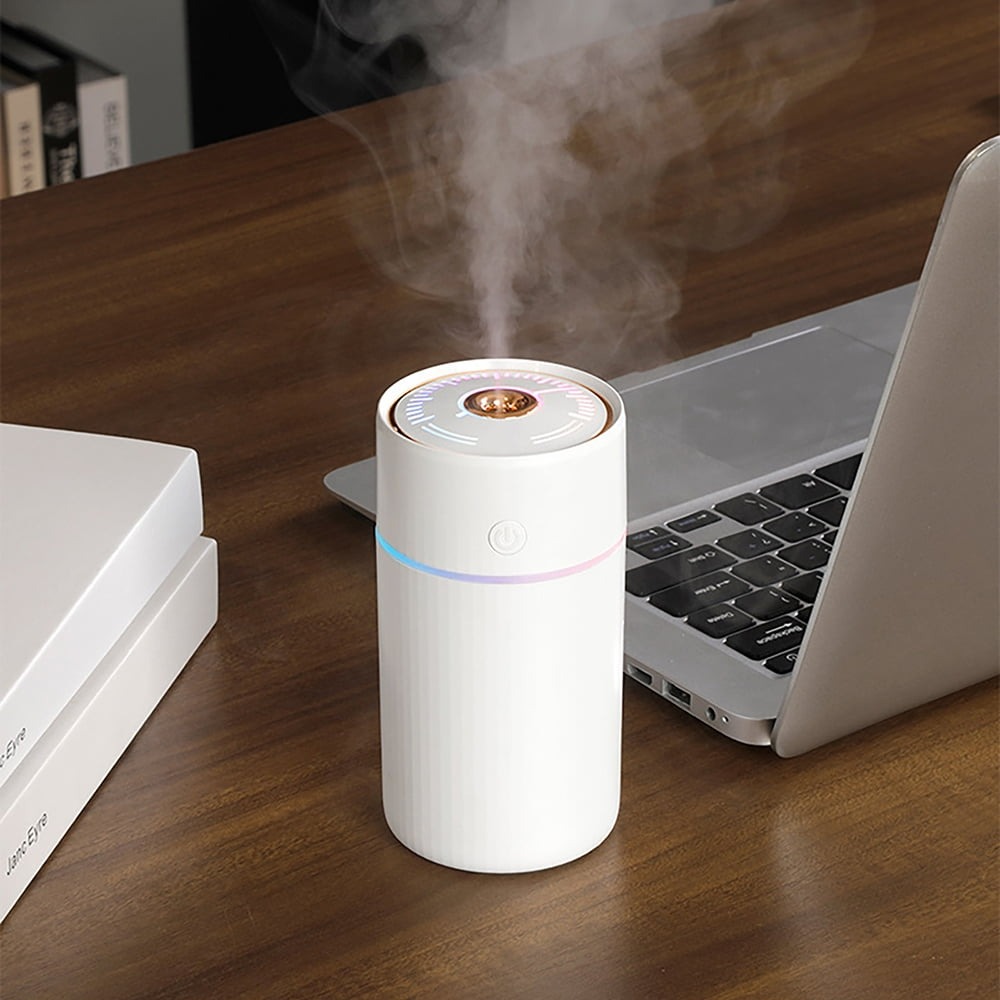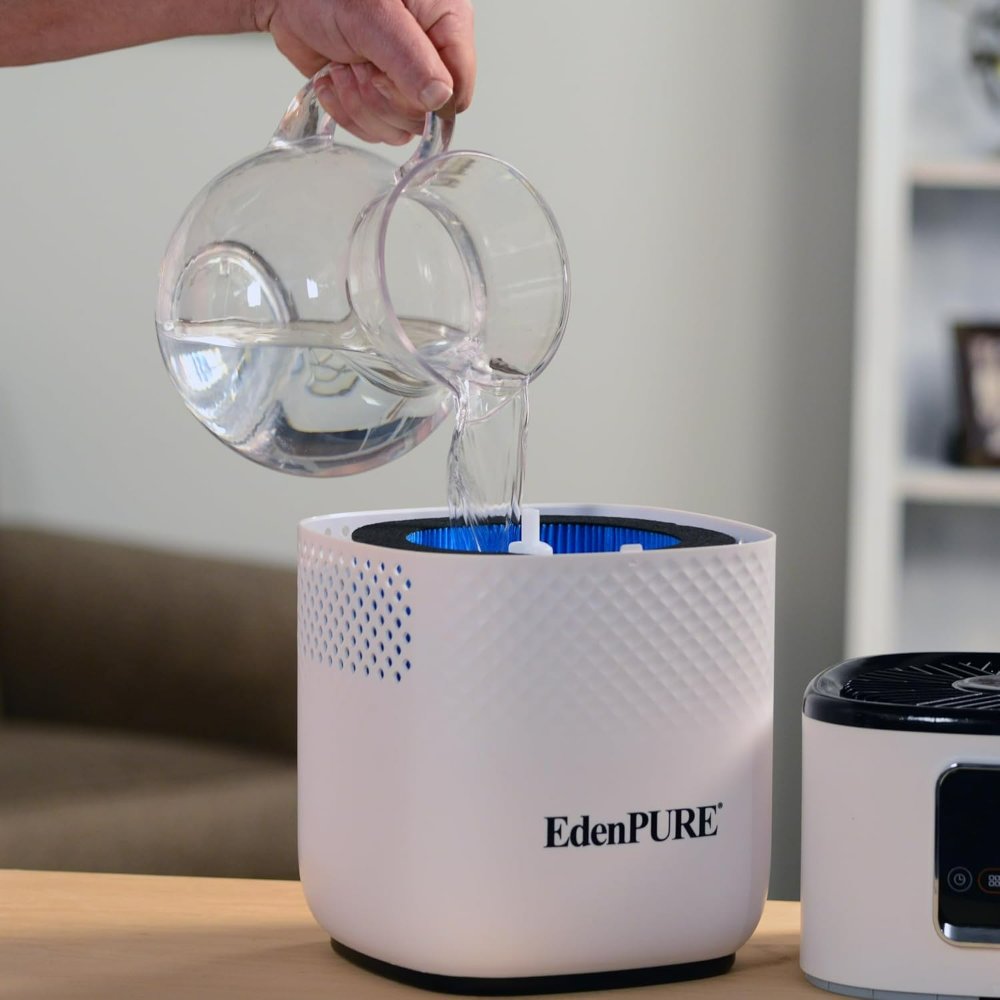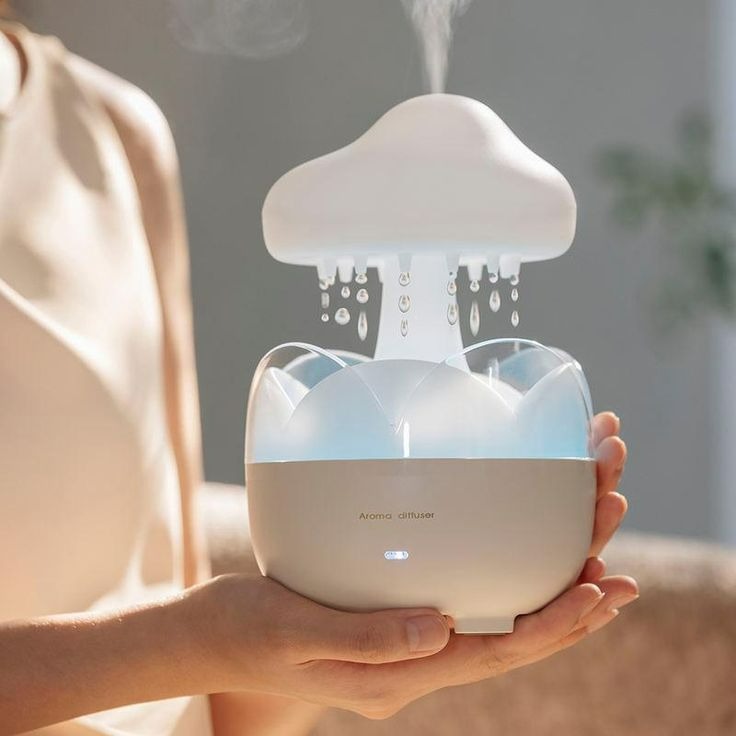What Are Evaporative Humidifiers?
Evaporative humidifiers are devices that add moisture to the air. They help to maintain a comfortable humidity level in your home. These humidifiers work by pulling dry, indoor air through a moist wick filter. As the air moves through the filter, it picks up moisture and then a fan disperses the humidified air throughout the room.
Evaporative humidifiers are widely popular because they are efficient and self-regulating. They differ from other types of humidifiers that use steam or ultrasonic technology. When the humidity in the room reaches an optimal level, the evaporation rate naturally slows down. This built-in ability to auto-adjust helps in maintaining the desired humidity without overdoing it.
These humidifiers can be particularly useful in dry climates or during winter when indoor air tends to be drier. By using an evaporative humidifier, you can prevent problems related to dry air. These include static electricity, dry skin, irritated sinuses, and respiratory issues. With proper care and maintenance, an evaporative humidifier can be a valuable tool for improving your home’s air quality.

How Evaporative Humidifiers Work
Evaporative humidifiers operate on a simple principle. Air circulates through a wet wick filter. This process naturally adds moisture to the air. A fan then pushes this moistened air out, raising indoor humidity levels.
Inside each evaporative humidifier, a wick filter absorbs water from a reservoir. The dry indoor air passes over the saturated wick. The water evaporates and vapor mixes with the air. The fan propels this humid air into your living space. The mechanism is energy efficient and eco-friendly.
As room humidity increases, the evaporation rate slows. This happens because moist air holds less additional moisture than dry air. So, the humidifier self-regulates, preventing excess humidity. This feature ensures a consistent and comfortable indoor environment.
Simply put, evaporative humidifiers balance your home’s air. They use a fan, a wick filter, and the natural process of evaporation. Together, these elements work to alleviate dry air issues effectively.
Benefits of Using an Evaporative Humidifier
Evaporative humidifiers offer numerous advantages for those seeking to enhance their indoor air quality. Here are some key benefits:
- Healthier Air: With a boost in humidity, these humidifiers make the air healthier. They help to minimize the issues caused by dry air such as irritated sinuses and respiratory problems.
- Comfort: The added moisture can make your home feel warmer. This can help save on heating costs during the cold seasons.
- Protects Your Home: Proper humidity levels prevent wood from cracking and static electricity. This means your furniture and electronics last longer.
- Energy Efficiency: They consume less electricity compared to other types of humidifiers, such as steam vaporizers. This can lead to savings on your energy bill.
- Self-Regulating: Because they slow down as humidity increases, evaporative humidifiers prevent over-humidification. This assures a comfortable and safe environment.
- Ease of Use: They are often simpler to operate and maintain than other humidifier models.
Incorporating an evaporative humidifier into your home offers a blend of health, comfort, and financial benefits. By using them, you’re choosing a cost-effective way to improve your overall indoor living experience.

Choosing the Right Evaporative Humidifier for Your Home
Selecting the best evaporative humidifier requires attention to certain factors. Review these points to find a unit that matches your needs:
- Room Size: Pick a humidifier that fits the size of your space. A small unit in a large room won’t be effective.
- Ease of Maintenance: Look for models easy to clean and maintain. This ensures lasting performance.
- Noise Level: Choose a quieter humidifier if it’s for a bedroom or a quiet area.
- Features: Consider extras like humidistats or timers. These add convenience.
- Brand and Price: Opt for proven brands. Compare prices to find good value.
- Water Tank Capacity: A larger tank reduces refills but may take up more space.
- Energy Consumption: Some models are more efficient. Check their energy ratings.
Using these criteria, you’ll select an evaporative humidifier that suits your home well. Moreover, you’ll enjoy the benefits it brings to your indoor air quality.
Maintenance and Care for Evaporative Humidifiers
Taking care of your evaporative humidifier is crucial for its performance and longevity. Here’s a straightforward guide to ensure its maintenance doesn’t become a hassle.
- Regular Cleaning: Clean your humidifier regularly to prevent mold and bacteria growth. Empty the water reservoir, wipe it down, and let it dry completely before refilling.
- Replacing the Wick Filter: The wick filter should be changed according to the manufacturer’s recommendation, usually after 1-3 months of regular use.
- Check for Mineral Build-up: Hard water can cause mineral build-up in your humidifier. Use distilled water or a demineralization cartridge if needed.
- Proper Storage: When not in use, especially during warmer months, store your humidifier in a dry place after thoroughly cleaning it.
- Inspect for Damage: Regularly check for any signs of wear or damage. This includes cracks or a deteriorating wick filter.
- Follow Manufacturer’s Instructions: Always refer to the user manual for specific maintenance guidelines tailored for your evaporative humidifier model.
By following these simple steps, you’ll keep your evaporative humidifier in good shape. This will help maintain a comfortable and healthy moisture level in your home.

Common Misconceptions About Evaporative Humidifiers
When it comes to enhancing indoor air quality, evaporative humidifiers are often misunderstood. Here are some common misconceptions debunked to provide clarity:
- They Are Noisy: Many believe these humidifiers make a lot of noise. Modern units are designed to operate quietly, making them suitable for any room, including bedrooms.
- Risk of Over-Humidification: Some worry about too much moisture. However, evaporative humidifiers self-regulate. They reduce their output as the air’s moisture level rises.
- High Maintenance: The thought that they are hard to maintain is incorrect. With simple, regular care, these devices can work efficiently for a long time.
- Limited Benefits: People might think the benefits are small. In truth, they provide significant advantages like healthier air, comfort, and protection for home and belongings.
- They Add Heat: There’s a notion that humidifiers heat the air. In fact, they add moisture without affecting the air temperature.
- Use a Lot of Energy: Concerns about high energy consumption are unfounded. Evaporative humidifiers are energy-efficient and can save on bills compared to other types.
By addressing these misconceptions, homeowners can better appreciate the value and effectiveness of evaporative humidifiers in maintaining a pleasant indoor atmosphere.
The Impact of Evaporative Humidifiers on Indoor Air Quality
The quality of air inside your home matters. Dry indoor air can lead to various health issues. An evaporative humidifier improves air moisture, enhancing air quality significantly. It’s important to understand this impact.
How Humidity Affects Air Quality
Higher humidity reduces dust and allergen presence. It keeps nasal passages moist, which helps in trapping dust and pollen. Moist air is less likely to carry irritants. This makes breathing easier and healthier. Low humidity can make air feel cooler and less comfortable. Balancing humidity levels with an evaporative humidifier helps in creating an optimal living environment.
Evaporative Humidifiers and Indoor Comfort
Evaporative humidifiers can make your home feel warmer. This warmth is cozy in winter without turning up the heat. Better air quality also means your electronics and furnishings face less risk of damage. They also help in preserving the integrity of wooden structures by maintaining stable humidity.
The Role of Evaporative Humidifiers in Health
With proper humidity, your body benefits greatly. You can avoid dry skin, sore throats, and other dry air problems. Consistent humidity levels support your respiratory system’s health. For those with asthma or allergies, this can be a game-changer. It can lead to fewer symptoms and better overall health.
By using an evaporative humidifier, you invest in the healthiness of your home’s air. Remember to maintain the unit to ensure it keeps providing these benefits. Good air quality is fundamental to a healthy lifestyle. An evaporative humidifier helps achieve this. Simple yet significant, its impact on indoor air cannot be overstated.
Safety Tips for Using Evaporative Humidifiers
When operating an evaporative humidifier, safety is crucial. These devices are generally safe, but you must follow certain guidelines to avoid potential risks.
- Keep It Clean: Regular cleaning prevents mold and harmful bacteria. Clean it as advised in the manual.
- Water Quality: Use distilled or demineralized water to reduce mineral buildup. It extends the humidifier’s lifespan.
- Proper Placement: Position your humidifier on a flat, stable surface. Keep it away from electrical appliances and direct sunlight.
- Electrical Safety: Ensure the humidifier’s cord is intact. Never operate with a damaged cord.
- Monitor Humidity Levels: Use a hygrometer to check the room’s humidity. Aim to maintain it between 30% and 50%.
- Child and Pet Safety: Place the humidifier out of children’s and pets’ reach. Prevent accidents and spills.
- Manufacturer’s Guide: Always follow the manufacturer’s safety instructions. They know your humidifier best.
These tips will help ensure your evaporative humidifier operates safely and efficiently. This way, you’ll get the maximum benefit without compromising on safety.